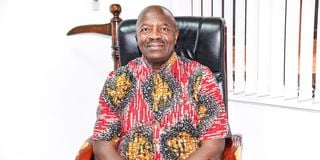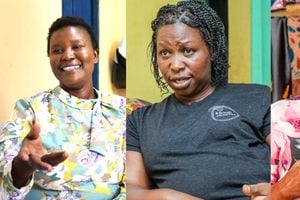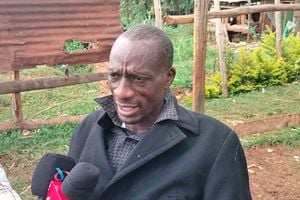
Irene Njeri a professional nurse during an interview in Westlands, Nairobi on October 9, 2024.
"In March 2023, I was 11 weeks pregnant with my second child. During a routine visit to my gynecologist, I discovered a small lump in my breast. It was tiny, so small that you had to search for it. It stayed in one spot, and I thought, "Let’s give it time." So, we waited for three weeks.
At 16 weeks, I decided to see a breast surgeon, who performed an ultrasound. The results showed it was a normal cyst, and we were advised to wait six weeks to see if it would shrink, which can happen during pregnancy. If it did not, I would have to go back.
The nurse in me knew that at 24 weeks, the chances of the pregnancy surviving were uncertain, so I chose to wait until 28 weeks when the baby would be viable because it would survive.
When I went back at 28 weeks, we did what is called an aspiration and a cytology, alongside another ultrasound. All the tests came back negative.
Then, at 32 weeks, one weekend, my right breast became hot and painful. I immediately thought it was mastitis, an infection in the breast, and felt relieved. I decided to wait until Monday to see my doctor again. He suggested we do another breast ultrasound, biopsy, and repeat another cytology. All this time, the tumor was still growing, but we were dealing with what we thought was just a cyst.
At 16 weeks, the tumour was 3 centimetres. By 28 weeks, it had grown to 6 centimetres, and by 32 weeks, it had reached 9 centimetres.
When we did the ultrasound, my radiographer, who is usually very talkative, went silent that day. He did not utter a word. It was strange. The tumour had mutated, so whatever we had seen earlier was totally different from what we were seeing.
I did my biopsy then. When the results came back, I could not download them, for some weird reason it just refused. I went to see my gynecologist and asked him to check the results for me. His face changed, and he said, "Irene, this is not good." You can imagine when the doctor is telling you that. In my mind, it did not matter how bad that matter is, unless they were dealing with the pregnancy first there was nothing the doctors could do about the diagnosis.
He did not show me the results but referred me to another specialist.
When I saw the specialist, she broke the news, breast cancer. After that, I did not hear anything else she said. The only things I could hear her say were the needed procedures in line.
Now at 34 weeks pregnant. My doctor told me we needed to deliver the baby as soon as possible because the tumour was growing aggressively it was at triple negative, one centimetre a week. By this time, it had reached 14 centimetres.
I told my doctor, "No, you will wait until I get to 36 weeks." I had been living with this tumour from when I was 13 weeks, it was not going to kill anyone in those remaining few weeks. Besides, I had planned to celebrate my dad’s birthday with the family, and I had to tell my family about everything that was happening.
It was a very difficult time because when you are waiting for results, you are not sure where you are heading to. There is no time for you to digest anything. I would wake up in the middle of the night and cry.

Irene Njeri a professional nurse during an interview in Westlands, Nairobi on October 9, 2024.
When the time came, I delivered my son safely. He never breastfed, he started formula from the very beginning. Soon after, I began chemotherapy. The first two weeks were confusing, I was not even sure what my body was recovering from. By the time I got my second chemo treatment on August 04, 2023, the reality was setting in. I finished my chemotherapy in December and had to wait four weeks before surgery.
I had months to mourn my breasts, from July, August, September, October, November, and December. By the time the surgery day came, I had accepted it.
The table day
On January 08, 2024, I went in for surgery, a bilateral mastectomy (removal of both breasts) with immediate reconstruction. I opted for a bilateral mastectomy because I did not want to go through this trauma twice since the left breast had a cyst that kept on popping every time I did an ultrasound.
What made my anxiety ease a bit is that, from the word go since diagnosis, the tumour’s size made a mastectomy inevitable.
This time, I was excited because we were treating it, it was not palliative care. I had learned to let go and let God.
My husband was with me that day, along with a dear friend who brought me a hairpin. I did not have any hair, not even eyelashes, but that small gesture gave me hope. I carried that hairpin into the operating room.
All my anxiety kicked in when I went to the theatre. I took my phone and looked at my booking time and it was 540 minutes of theatre time.
When I woke up, the pain was unbearable, as if someone had taken away my chest, but they sorted out the pain.
I saw my husband by my side, it was the best feeling in the world. The next morning, I was up and about, walking around with my two container drains.
During the surgery, they also performed a reduction on my left breast to balance them out. I had been a double D cup, and now I am a cup A.
The surgery story is quite complicated for me. At some point, the drain on the right side started leaking and just when I was about to be discharged the left side also started leaking. I also had internal bleeding, which led to a second surgery.
My friends and family were always there with me, and I was never alone.
After being discharged, they found out that I had an infection on the left breast during a follow-up visit but it cleared after treatment. Everything cooled down a bit, and we started doing radiotherapy.
Currently, I am still on medication for my recovery. However, I am on anti-depressants because I got into a depressive state. It’s a journey, today you feel fine the next time it's overwhelming and it shifts you off balance.
Surprisingly I have always wanted to do a breast reduction surgery so losing my breast was like a coincidence.
Cancer complications
When I gave birth to my son I got the normal perineal tear, but two and a half weeks later my stitches came out. I still blame it on chemotherapy. I had to go to surgery for the repair and it was painful.
After a week and a half, the pain had gone down, and I was happy even planning to go back to work, then I started feeling some certain pain which was different from the pain I was feeling from surgery but I ignored it.
I reported to work in so much pain because I did not just want to stay at home. To my shock, I had gotten another infection. I was admitted for antibiotic therapy because now my body could not fight on its own. I also developed a wound from radiotherapy on my right breast that they had to dress for another three weeks before it healed.
In May, I was also admitted because I had lost it. I felt I did not have a reason to be alive anymore, I was very depressed, I had lost people close to me and my life was a mess. It had been one complication after another, I am in and out of the hospital. When I am doing a curative treatment plan, it is easy because at least I have a plan, but now, after radiotherapy, there is nothing else for me.
It is also difficult to get a bra my size because my breast is a cup A and my waist is a 34. This has been the most challenging journey for me. Everything has changed, although it is getting better now.
Because of the frequent infections as well, my bladder started getting very sensitive; they call it an overactive bladder. I started leaking urine, although it is getting better as time goes by.
As I wait for my scan, my mind is not about whether it is positive or negative; I am settled on what is next. All this makes me want to live life. Who said I will have to die of cancer?’’

Prof Wasike is a Breast Surgical Oncologist and General Surgeon at Aga Khan University Hospital.
Doctor’s perspective
Prof Ronald Wasike, a Breast Surgical Oncologist and General Surgeon at Aga Khan University Hospital, says, "When we talk about early breast cancer, we are referring to stages 0, 1, and up to stage 2B,"
"One of the upfront options for treatment is a mastectomy, but breast conservation surgery, such as lumpectomy, is also an option." Mastectomy involves removing the entire breast, while breast conservation surgery removes the cancerous lump, preserving the rest of the breast.
Prof Wasike notes that, “A modified radical mastectomy is one of the options we offer for early-stage breast cancer. This is usually chosen when there are multiple breast lesions, or the tumour size is large compared to the breast. However, we sometimes administer chemotherapy beforehand to reduce the tumour size, allowing for breast conservation."
The psychological impact of mastectomy is significant, and many patients struggle with their self-image after losing a breast. "Suicide is often linked to a loss of hope, a loss of self-worth," he observes. "So preserving the breast can play an important role in the patient's mental health and overall survival."
Types of mastectomy
Different types of mastectomy are performed depending on the stage of the cancer and the patient's circumstances. "The most common type is the skin-tight mastectomy, where the skin is tightly closed over the surgical site. This is often used for large tumours where reconstruction is not planned immediately," says Prof Wasike.
For smaller tumours or patients undergoing prophylactic mastectomies due to genetic predispositions, a skin-sparing or nipple-sparing mastectomy may be performed. "Skin-sparing mastectomies remove the breast tissue but preserve most of the skin for future reconstruction," Prof Wasike explains. "For nipple-sparing mastectomies, the tumour must be at least two centimetres away from the nipple to ensure it can be safely preserved."
Recovery and post-operative care
The typical recovery time for a mastectomy is about two weeks. "Patients can expect to be in the hospital for two days, and the surgery itself takes around one and a half to four hours, depending on the surgeon," the specialist says. After surgery, patients need to follow a structured recovery plan, which includes regular check-ups. "We see patients one week, two weeks, and one month after surgery, and then continue follow-up visits at three months, six months, and annually."
For patients requiring additional treatment, mastectomy is often followed by chemotherapy, hormonal therapy, or radiation therapy. "Healing from the surgery takes about four weeks, and then we assess whether they are ready for the next stage of treatment," he explains.
Reconstruction after mastectomy
Reconstruction can often be done immediately after a mastectomy, but not in every case. "If the cancer is in its early stages, we can perform an immediate reconstruction," Prof Wasike explains. "However, if the cancer has spread to the lymph nodes, and the patient will require radiation, we prefer to delay reconstruction. Radiation can damage implants and make the results less aesthetically pleasing."
When reconstruction is performed, both breasts are typically involved to ensure symmetry. "Even if only one breast is affected, we work on both breasts during reconstruction to maintain balance and symmetry," he notes. "It’s important for the patient’s mental health that the reconstructed breast looks as close as possible to the other one."
While mastectomy is a safe procedure, there are risks involved. "The most common complications are bleeding and infection, but the biggest concern is nerve injury, which can lead to arm swelling or lymphedema," he warns. "We take every precaution to avoid nerve damage and excessive lymph node removal, but patients need to be aware of these risks."
Prof Wasike advises patients to avoid using the affected arm for tasks like measuring blood pressure or lifting heavy objects because this can exacerbate lymphedema. "We give this information repeatedly before and after surgery to ensure patients fully understand how to care for themselves," he says.
Male breast cancer and mastectomy
Male breast cancer is rare, but the procedure for treating it is largely the same as for women. "For men, we don't perform breast conservation because the breast tissue is too small," Prof Wasike explains. "We always opt for mastectomy, and reconstruction is typically not requested by male patients."
In cases where the cancer has spread from one breast to the other, a double mastectomy may be necessary. "It's rare, but sometimes cancer moves from one breast to the other, usually in later stages," he says.




